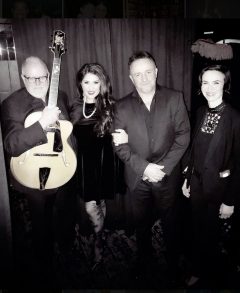Cover Story
Sacha Boutros Sings a Song of Joy
Sacha Boutros looks across our table at me. “How about this one,” she says, “Shine on, shine on harvest moon…” She sways a bit with the magic lilt of the song. Boutros is singing lightly, even still her mezzo-soprano carries to other tables in the restaurant. I see a few smiles as folks glance over our way.
“Well, what about this one?” I counter, “‘Be sure it’s true, when you say, I love you. It’s a sin to tell a lie…’” My singing has been compared to the worst of Bob Dylan crossed with Kermit the Frog, but we’re having such a good time, I’m unembarrassed to display my lack of talent right now. I then think of another old favorite. “Hey, I’ve got a good one for you, ‘They’re writing songs of love, but not for me.’”
“That’s Gershwin! Do you know the intro?” Then Boutros sings:
Old man Sunshine, listen, you,
Never tell me dreams come true,
Just try it, and I’ll start a riot…
There are more smiles from other tables. I hear someone say, “Yes!” As most folks who know me will tell you, I’m a fool for old Tin Pan Alley and Broadway show tunes, and right now I’m having one of the best times that anyone in music journalism could hope for, sharing songs with a fellow song addict. I know I should have my music journalism hat on right now, fighting against Fake News and bringing the people objective reporting on singers, sax players, and songwriters, that I should sit back, get my pen back to my notebook, and get back to my well researched and prepared questions for my interviewee, but sharing my love of Gershwin, Cole Porter, and Hoagy Carmichael with Sacha Boutros is a temptation I cannot pass up.
I should not be surprised by the spontaneity or the fun, because these are a couple of the things that, more and more, Sacha Boutros is emphasizing in her life and in her music. “This year I had a near death experience,” she says. “What I’ve tried to do since then is take something that was frightening and think of it as a great opportunity. Now, I want to share joy with people.”
As it turned out, Boutros’ brush with mortality was not a cliffhanger in the Alps or Pyrenees, but a very quiet and supposedly safe undertaking. During a visit to San Francisco, a friend opened a bottle of wine. Seconds later Boutros knew she was in trouble. “My throat closed,” she says. “I remember thinking, ‘Is this an asthma attack?’” It was the next day, when she saw a doctor that he told her that she had had a reaction to the mold in the cork of the wine bottle and gone into anaphylactic shock, a potentially life-threatening reaction to an allergen.
Boutros has a new conscious emphasis on joy, but her whole life and career has been one of bringing the joy of music to thousands. For two decades the San Diego native has brought her particular brand of jazz and pop vocals to San Diego, New York, Paris, and plenty of other cities throughout the world. She has performed with or opened for James Moody; Marvin Hamlisch; Julio Iglesias; the man who introduced the world to the twist, Chubby Checker; as well as scores of other great pop and jazz talents. Her recordings have been well received by fans as well as the music industry, with all of her CDs getting notice by the Grammys. In 2006 Riviera San Diego magazine took note of Boutros as one of the “hottest music artists to come out of San Diego.”
After years and years of performing the world over, Boutros knows more than a thing or two about what audiences want. Her song choices rest on what city she is in and the type of audience at a particular restaurant or cabaret. In Japan they want a lot of jazz standards. Boutros mentions San Francisco as a town that has sophisticated tastes. In the cabarets of New York people expect more than a musical performance; they want a show.
Decades ago American bands were asked to perform “Those Were the Days,” the 1968 medley of hit from Welsh folk singer Mary Hopkin. According to Boutros, apparently the grandchildren and great-grandchildren of Europe’s hippies grew up hearing their elders play the recording and still want to hear the song of simple regrets. She admits that it is not on her list of regularly performed songs.
One of the first things that most folks notice when they see Boutros perform is how relaxed she is. Going from song to song, bantering a bit with the audience, she seems to be just as much at home as she is when she has her feet up at home. And she always tries to connect with her audiences. “You go see a lot of jazz musicians and there’s no personality. I want to see somebody who is entertaining,” she says. “I don’t want to see somebody with an attitude. I’m not about ‘listen to me.’ I want to connect with people. All those people took time to come out to hear you, you owe them some respect.”
That attitude and ease with the audience was on display at a recent performance at the Handlery, the weekly Friday evening jazz showcases at the Mission Valley hotel.
Wearing a knee-length black dress Boutros glided through two sets of standards and old favorites with pianist/composer Irving Flores and bassist Evona Wascinski. The place, as usual, was packed, and packed as well with a very receptive crowd. The folks who come to the Friday music showcases are true music lovers. I look around and see a lot of the regulars.
Boutros has a commanding presence. This is due in large part to her years of experience as a singer, and due at least in part to her natural good looks. The San Diego native has long, black hair that frames her dark mahogany colored eyes. Her aquiline features hint at her Mediterranean heritage–her father is Lebanese, while her mother is Mexican.
As I contemplate the usual happy hour dilemma (potato skins or buffalo wings?), Boutros launched into the night of song with one that Frank Sinatra still owns, “The Lady Is a Tramp.” She followed with two songs that hint at Boutros’ international flair, a light French song and a more spirited Mexican number. Throughout, the mood was friendly and playful.
Reassured to find a San Diego bar, any bar, actually, where the choices for beer do not stretch the length of two sides of a menu, I chose a pilsner. Boutros, perhaps inspired by the googie architecture and the tikis that in all their faux exoticism and lack of irony populate the Handlery, chose the Rat Pack and Sinatra again for a quiet interpretations of “One For My Baby” and “Witchcraft.” The more subdued feel of the evening continued with a low-key take on Juan Tizol’s “Caravan.” The impression was a performance as a cohesive whole, rather than a grab bag of one song after another.
Besides speaking Spanish and English, Boutros is a true polyglot, being more than familiar with French, Italian, Portuguese, Arabic, and the Alemannic dialects of the German-speaking regions of Switzerland. As a jazz singer, she of course lists Frank Sinatra as an influence. In her musical development she also credits the considerable talents of Antonio Carlos Jobim, Julie Andrews, Nancy Wilson, and the “Little Sparrow” national chanteuse of postwar France, Edith Piaf, as well as her fellow countryman Enrico Macias.
In music journalism, writing up profiles of musicians and performers, certain life experiences appear and reappear. For musicians, a common thread is a childhood in which music is encouraged or fostered in some fashion. Musicians have parents who were music enthusiasts or encouraged their children to take music lessons. Sometimes there is an older brother or sister or another relative who plays the guitar, tambourine, or bagpipes.
That is why I was utterly surprised when Boutros described her upbringing to me. “Music was a taboo in my family,” she says. Though she took classical piano lessons as a child, her father discouraged any sort of musical pursuits as she was growing up, and as the young Boutros was contemplating her major as a scholarship student at the University of San Diego, music was certainly verboten. “‘Doctor, lawyer, engineer. ‘Doctor, lawyer, engineer.’ ‘Doctor, lawyer, engineer.’ That’s what my father repeated as my career choices and educational routes when I was going to college,” Boutros says. “I said, ‘Daddy, what about business?’” For the elder Boutros the choice of classes in finance, accountancy, and economics proved to be promising enough for his daughter and gave approval for her choice. She takes with good humor that many in her family are still flummoxed by her career choice. “There are people in my family who still say, ‘When are you getting a job?’”
At this juncture, another aspect of Boutros’ life, sports comes into focus. She had played soccer growing up, learning much about the international sport from the San Diego Soccers’ Hall of Famer Jean Willrich. Her talents on the field proved good enough for her to attend USD on soccer scholarships. Other aid came from academic scholarships. After college, Boutros played soccer semiprofessionally for ten years. “I still play soccer,” she says.
So, the business world is short one accountant or MBA, or the soccer world is short one forward or defensive mid-fielder, but the music world has one more singer, and a really good singer at that. Boutros is classically trained, having studied opera. She has been assessed as having a four and a half-octave range. (To put that in perspective, the average operatic singer is expected to have a two-octave range. Maria Callas, one of the greatest opera singers to grace the stage of New York’s Met or La Scala in Milan, Italy had, in her prime, a three-octave range, 18 notes short of Boutros’ ability.)
Though Boutros is grounded in Verdi and Puccini, she is a jazz singer and a singer of popular tunes. And as Ella Fitzgerald or Mel Tormé could have told you, no one falls off the hay wagon and just starts singing jazz. Boutros honed many of her jazz and pop chops at the Red Fox Room, the steakhouse attached to the Lafayette Hotel on El Cajon Boulevard. She was a regular back in the day when Shirley Allen, a talent of whom was said that she knew every song ever written, ruled the keyboards at the nightspot for over 14 years and well into her seventies. “She taught me so much. I saw her three to five times a week for years,” Boutros has said. “I went and sang there as much as I could with her; she had the most amazing musical style. People don’t have that sound anymore or know that many songs.”
As a child, Boutros played piano and even took lessons until kindergarten. “And I learned to sing in church with my grandfather,” she says. Then, music was out of her life for several years, until her parents divorced and Boutros’ grandmother gave her a piano. Curiously, her father, who discouraged his daughter’s exploration of music, was himself a bit of a musician. He played the doumbec, a goblet-shaped type of drum that is played throughout North Africa, South Asia, and the Middle East.
When she was older, Boutros took private singing lessons on her own, though the expense grew discouraging. She made the rounds to jam sessions, making her way past some of the prejudices that even some musicians are guilty of, that singers aren’t serious or “real” musicians. She nonetheless made a point of making it to as many jams as possible and shaking as many hands as possible. “I was meeting everybody in the music community,” she says.
Talent and moxie paid off, and success was quick in coming. Many musicians apprentice at less-than-desirable gigs for years, waiting for their chance to hit the big time. For Boutros, that time in musician purgatory was extremely short. The second gig she performed was with Mike Wofford, San Diego’s premier jazz pianist, who had been music director for Sarah Vaughn and Ella Fitzgerald and performed with Shorty Rogers, Chet Baker, Joe Pass, and many more jazz luminaries.
At about the same time, Boutros landed one of the most coveted things among musicians: steady work. She approached the owner of a local restaurant for a gig, “He told me, ‘If you sing as good as you look, you’ve got the gig,’” she says. “I worked there the whole summer. We were there every Thursday. We packed the place!”
And just as quickly, she was off touring in Japan. Red Holloway’s promoter, who is from Japan, got wind of the new singer and booked her for several dates in the Land of the Rising Sun. It was, however, one of her first encounters with the curious expectations audiences have for their performers. Boutros says that the audiences in Japan were unsure of what to make of her. She is a jazz singer, but she does not physically resemble Ella Fitzgerald or Billy Holiday.
Despite this early success, more than her fair share of discouragement has come to Boutros. She has experienced years of hearing comments from promoters and other music industry folks such as “you’re too ethnic… you’re too old… you have too much [fill in with personal attribute]…” A vice president of Sony records told Boutros that she was too old to be considered by the major label (though she is still in her 30s), and she has been repeatedly told that people love her voice, but she doesn’t look like a contestant on American Idol. She has also eschewed trendy career advice “Dye your hair blue and sing like Siouxsie and the Banshees,” as well as the casting couch expectations for which many in the entertainment industry have become infamous.
These career speed bumps and roadblocks have left Boutros undaunted. Besides her musical talents, she has put all of her training in business to good use. She handles all of her own promotion and marketing. Throughout her career she has served as her own business manager, handling both national and international contracts.
Boutros released her first compact disk recording in 2008. Simply Sacha displays her wide-ranging talents in jazz and blues and features talents such as Grammy-nominated pianist and composer Geoffrey Keezer, Cuban pianist Chuchito Valdez, and the late sax legend Red Holloway. She recorded a live CD in Hawaii in 2011. Her most recent CD, New York After Dark, was recorded in San Diego, New York, and Paris. The disk of mostly jazz standards includes two songs written by Boutros and features San Diego guitarist Peter Sprague and pianist Mikan Zlatkovich.
At the beginning of next month Boutros is off to what might be considered her second home, Paris. With an artist visa, which will allow her to stay in France for seven months, she has a number of performances scheduled that will have her hopping all over the map of Europe, with appearances in Paris, London, Vienna, and other major cities.
Boutros has always made her own way, bucking a lot of prejudices and trends. With Sacha’s Supper Club she bucks an entire southern California mindset. In our region of the world, where flip flops, cargo shorts, and faded T-shirts are the unofficial uniform, where sneakers and jeans are worn to formal occasions and the opera (yes, dear reader, the opera!), Sacha’s Supper Club is an evening, a performance, and an entire experience that harkens back to a time when kerchiefs were properly and tightly pressed into men’s jacket pockets, when women’s moons were left uncovered by nail polish, when women danced all night, even in those heels. And men doffed their hats in pre-JFK fashion.
The first incarnation of the Supper Club was, appropriately, at the Lafayette Hotel, which retains the Hollywood glamour of its heyday. Opening in 1946, the hotel hosted Ava Gardener, Bing Crosby, Bob Hope, and other stars of the silver screen. Star swimming athlete Johnny Weissmuller, who had one of the most outstanding competitive, swimming records, as well as being the big screen’s first Tarzan, designed the Lafayette’s swimming pool.
Boutros plans and perfects the events down to a fare-thee-well. “Look at this!” She displays a napkin from one of the Supper Club events, black with gold printing in true art deco fashion. It looks like the image is not just printed but embossed onto the paper. The first of Sacha’s Supper Club was back in 2015 and has continued periodically at the Lafayette Hotel ever since. Each Supper Club has a bygone theme. “Havana After Dark” and “Holiday in Havana” recreated the time before Fidel Castro’s Cuba, and “Vintage Vegas” brought back the days of the Rat Pack and the Mad Men mentality. Singers such as Rebecca Jade, Whitney Shay, and Jonathan Karrant have joined Boutros on these special performance nights.
“That first night, we had 287 people there. We were in the Mississippi Room and had the big band in the shell. The band was totally dressed up. Really fun, dressed to the nines,” Boutros says. “We had ten people there from the original opening. These people had some great stories. One man told me that he brought his wife there every Friday night to dance. I danced with my dad. He said, ‘Sacha, look around you. Look at all the people. Look at their faces. Look at all the joy you created!’”












